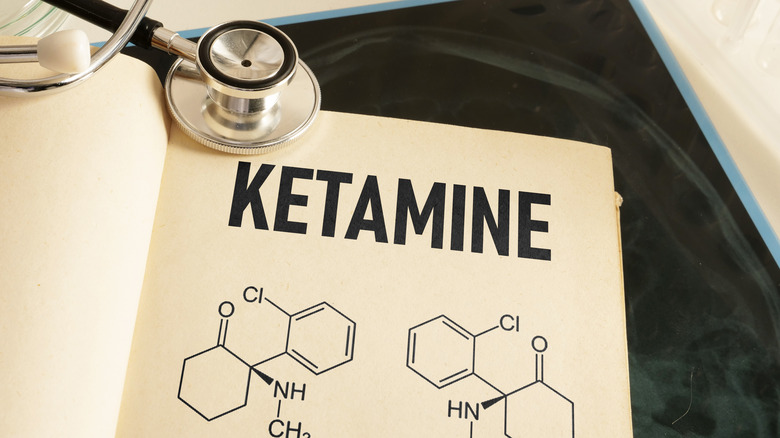Matthew Perry's Death Has Doctors Issuing Important Warning
Matthew Perry's sudden death in October 2023 at the age of 54 sent shockwaves throughout the media. How did the beloved "Friends" star, who had won six awards and was nominated for more than 30 others, die? As it turns out, a single drug precipitated his death. And the medical community and law enforcement is taking steps to warn the public about the drug through its connection to Perry.
The drug in question is called ketamine. As explained in a 2022 article published in Discover Mental Health, ketamine is a general anesthetic. The article's authors also note that while ketamine was not originally intended to be used for psychiatric purposes, its application has shown some promise as a possible antidepressant or mental health treatment.
Nonetheless, the article's authors advise that more research on ketamine's use to treat depression is appropriate because of the drug's known side effects that include high blood pressure, tachycardia, and dissociation. In their conclusion, they remark that "investigations into ketamine's effectiveness for other disorders or subtypes, alternate formulations, and its use in conjunction with therapy all require additional study and must be reproduced consistently before being added to standardized treatment guidelines."
However, recent arrest announcements in conjunction with Perry's death reveal that his doctors, their associates, and one of his employees may not have followed such warnings. On the contrary, five individuals are alleged to have either prescribed, illegally obtained, or administered the ketamine that ultimately caused Perry to slip into unconsciousness and die.
Ketamine's role in alleged medical malpractice
What's gone wrong with ketamine and why is it being abused? As explained in a November 2023 piece issued by the Associated Press (AP), doctors nationwide may be substituting ketamine treatment for opioid treatment in patients with anxiety, depression, and generalized pain. The piece adds that though little research has been done on the safety and efficacy of ketamine as a psychiatric treatment or painkiller, many in the medical field are still relying on it.
In the AP piece, Duke University's Dr. Padma Gulur went on the record to expound on why she believes medical professionals may be moving quickly to prescribe ketamine, despite the fact that it can cause serious side effects (including hallucinations). "There's a paucity of options for pain and so there's a tendency to just grab the next thing," she said. "A medical journal will publish a few papers saying, 'Oh, look, this is doing good things,' and then there's rampant off-label use, without necessarily the science behind it."
Gulur's concerns are shared by some California law enforcement officials. In an August 15, 2024, release, the U.S. Attorney's Office, Central District of California announced that five individuals had been arrested because of their alleged link to Matthew Perry whose death has been ruled due to an overdose of ketamine.
Allegations of fraudulent ketamine distribution and related activities
According to the U.S. Attorney's Office, Matthew Perry's last weeks of life included being injected with ketamine that was illegally obtained by Jasveen Sangha and Dr. Salvador Plasencia. Both Sangha (referred to by the AP as the "Ketamine Queen") and Plasencia are alleged to have distributed ketamine as well as tampered with information and evidence during the investigation into Perry's death.
Although ketamine is not necessarily illegal and has limited, FDA-approved legitimate applications according to the U.S. Department of Justice, prosecutors in the Perry criminal lawsuit are alleging that Perry's doctors and their associates acted more like "drug dealers" in giving him high, constant doses of ketamine without regard for its known physical effects. Noted Martin Estrada, a United States Attorney, "These defendants cared more about profiting off of Mr. Perry than caring for his well-being ... This case ... send[s] a clear message that we will hold drug-dealers accountable for the deaths they cause."
Protecting others against ketamine-associated adverse effects
Doctors and officials are leveraging Perry's experience with ketamine — and highlighting his experience of being allegedly misled by physicians he trusted — to prompt discussions and share insights about the drug. For example, a 2020 fact sheet on ketamine abuse published by the U.S. Department of Justice Drug Enforcement Administration clearly outlines that ketamine "may be abused for its abused for its ability to produce dissociative sensations and hallucinations." The fact sheet adds that overdosing on ketamine, as Perry did, can lead to unconsciousness and a dangerously slow breathing pattern.
An August 2024 New York Times article on Perry's tragic death indicates how addicted the actor had become to ketamine in the days before he died. Allegedly, Perry asked his personal assistant — one of the five people indicted by prosecutors — to inject him with "a big one" of ketamine before he got into his hot tub. (According to the assistant, he was asked by Perry to administer ketamine injections up to eight times daily.)
Later, the assistant found Perry dead in the hot tub. Perry died with approximately the same amount of ketamine in his system as doctors would use to anesthetize patients for medical procedures.



